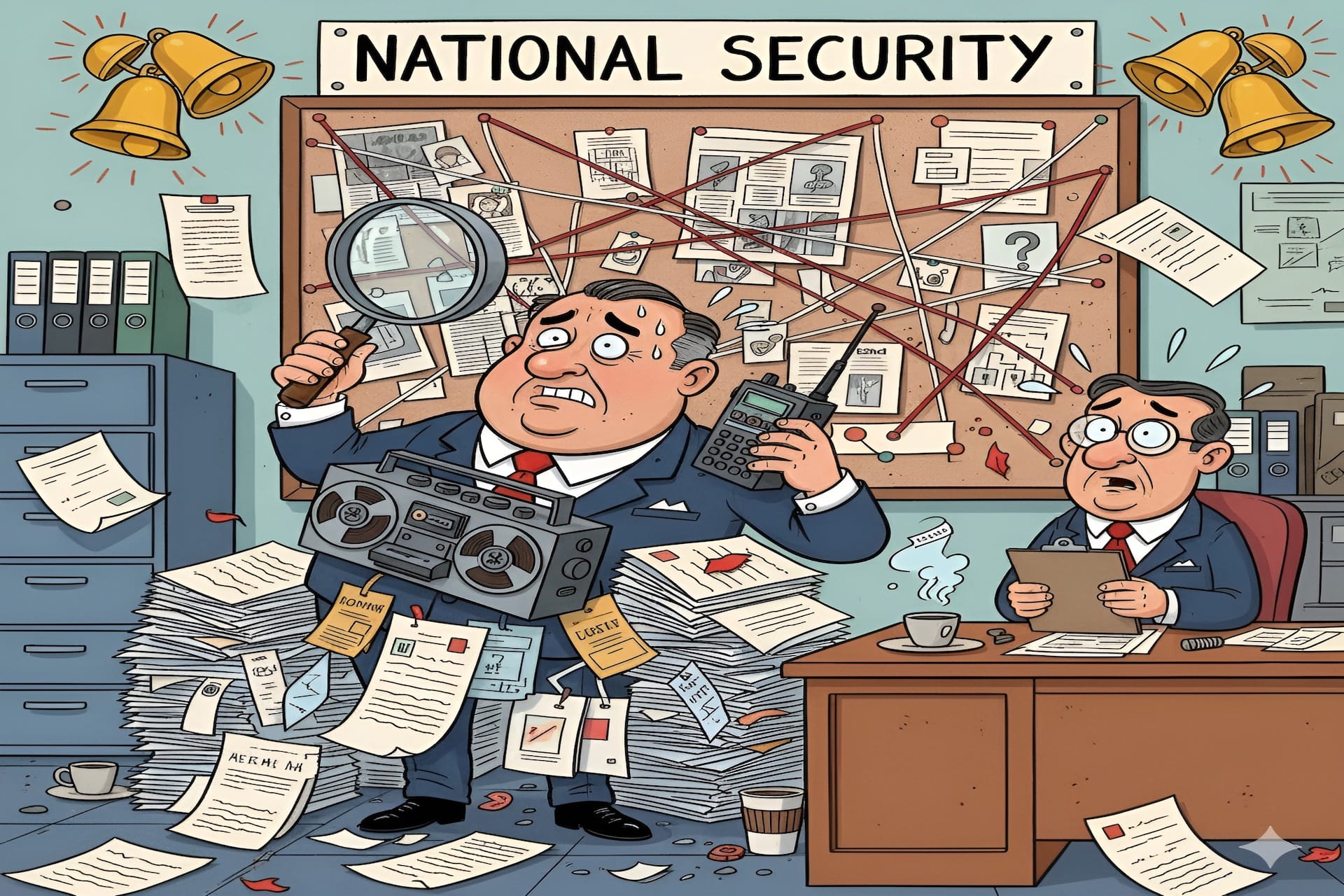Muslim Brotherhood Infiltration in Austria: DSN Spy Scandal Shakes Vienna 2025
An Austrian intelligence officer allegedly leaked sensitive information to the Muslim Brotherhood in 2025. The DSN infiltration scandal exposes systemic vulnerabilities and raises questions about oversight and national security.
AlpeAnony

Introduction
On October 8, 2025, Austrian media shook the nation with reports of a serious breach within the Head Office of State Security and Intelligence (DSN), Austria’s top counterintelligence and counterterrorism agency. Allegedly, an officer in the counterterrorism department provided confidential information about ongoing investigations to individuals linked to the Muslim Brotherhood.
The officer, now suspended, is under investigation by the Vienna Public Prosecutor's Office for abuse of office. While details are still emerging, this incident highlights Austria’s systemic vulnerabilities in intelligence oversight and exposes the delicate balance between national security and political accountability.
The Alleged Infiltration and DSN Operations
The officer in question reportedly worked in counterterrorism, handling sensitive investigations. Authorities allege that over several months, he made multiple inquiries at the ministry without official reason, potentially passing intelligence to the Muslim Brotherhood. The purpose of these inquiries, their frequency, and their content are now under thorough investigation.
Police also conducted a search of the officer’s home, seizing evidence that may clarify the extent of the information leaks. The Austrian public is questioning how an officer with such sensitive access could compromise the nation’s security and what measures will be taken to prevent similar breaches in the future.
Austria’s History of Espionage Scandals
Austria has a long and complex history of espionage scandals, often involving former BVT (Federal Office for the Protection of the Constitution and Counterterrorism) agents:
- Egisto Ott and Martin Weiss (2017–2021): Accused of selling state secrets to Russia.
- Retired Austrian Army Colonel (2018): Allegedly spied for Russia since the 1990s, receiving €300,000 for sensitive military information.
- Russian Disinformation Network (2025): Bulgarian liaison arrested for spreading pro-Russian narratives and fake news, with real-world destabilization actions.
These incidents underscore Austria’s recurrent espionage vulnerabilities, particularly in Vienna, a city long considered a hub for international intelligence due to its neutrality and concentration of global organizations.
Motives Behind Espionage in Austria
Experts analyzing these scandals point to three key motivations for officers betraying state trust:
Financial Gain
Many spies are driven by greed and financial incentives. Egisto Ott’s case demonstrates how promises of substantial sums can outweigh loyalty, particularly when salaries in sensitive positions feel inadequate. Experts argue that underpaid officers may see espionage as a pathway to wealth unattainable through lawful means.
Ideological Conviction
While financial motives dominate, ideological alignment can also be a powerful driver. Officers may leak information to support causes they perceive as superior or justified, including political or religious movements.
Personal Ties and Manipulation
Espionage often spreads through personal networks and ambition, exploiting relationships and trust. For example, Martin Weiss allegedly received requests from a fugitive connected to Russian intelligence, creating a chain of information leaks influenced by personal connections and ambition.
Systemic Vulnerabilities in Austrian Intelligence
Several structural and legal deficiencies contribute to espionage risks in Austria:
- Outdated laws: Until recently, espionage laws criminalized spying against Austria, but not foreign entities or organizations based in Vienna, creating a legal loophole.
- Weak oversight: Austrian intelligence services have historically lacked sufficient checks and monitoring, allowing breaches to occur unnoticed.
- Political interference: Past police raids on BVT offices (2018) revealed sensitive information and sparked allegations of political motivation, highlighting vulnerabilities to partisan influence.
Experts emphasize that without legal reform and stricter oversight, Austria remains exposed to both internal and external intelligence threats.
Implications of the DSN Infiltration
The alleged DSN infiltration has far-reaching consequences:
- National security risks: Confidential information about counterterrorism investigations may have been compromised, endangering ongoing operations.
- Public trust erosion: Citizens expect intelligence services to safeguard the nation. Breaches undermine confidence in these institutions.
- Operational disruption: Investigations, covert operations, and inter-agency collaboration may be jeopardized if sensitive data is leaked.
This scandal prompts urgent questions: How can Austria protect its intelligence services from ideological influence? What reforms are necessary to prevent insider threats?
Vienna’s Role as an International Espionage Hub
Vienna’s status as a neutral city hosting numerous international organizations makes it particularly attractive to foreign intelligence operations. Spies exploit Austria’s global connections to collect, manipulate, and disseminate information without immediate detection. The Muslim Brotherhood infiltration case emphasizes the intersection of ideology and global networks in espionage activity.
Recommendations for Reform
Experts and analysts suggest a multi-layered approach to address vulnerabilities:
Strengthened Oversight
- Introduce independent audits and internal compliance checks.
- Regularly review officers in sensitive positions for potential conflicts of interest or unexplained behavior.
Legal Reforms
- Update espionage laws to criminalize spying against international organizations based in Austria.
- Close loopholes that previously allowed prosecution challenges.
Financial and Career Incentives
- Ensure officers in critical roles receive competitive compensation to reduce financial temptation.
- Offer career development programs to incentivize loyalty and long-term service.
Political Neutrality
- Safeguard intelligence services from political interference.
- Establish protocols to ensure operations remain impartial, even during party transitions or ideological disputes.
Enhanced Counterintelligence Training
- Regular workshops and simulations to identify insider threats.
- Emphasis on ethical behavior, loyalty, and understanding of foreign espionage tactics.
Lessons from Past Scandals
Past espionage scandals provide clear insights:
- Espionage thrives where financial temptation, ideological alignment, and weak oversight intersect.
- Political disputes or interference can weaken intelligence agencies, increasing vulnerability to infiltration.
- Systemic reform is urgent to prevent repeat incidents, particularly in sensitive areas like counterterrorism.
The DSN case is a reminder that insider threats are often the greatest risk, as trusted officers have access to highly sensitive information.
Public Debate and Societal Impact
The Austrian public has reacted strongly to the DSN scandal, raising questions about:
- Trust in intelligence and law enforcement agencies.
- Adequacy of compensation for officers in sensitive positions.
- Measures to prevent ideological exploitation and foreign influence.
Experts suggest a balanced public debate, recognizing the complexity of espionage while demanding accountability, legal reform, and structural improvements.
Conclusion
The alleged infiltration of the DSN by a Muslim Brotherhood-linked officer in 2025 highlights Austria’s ongoing intelligence vulnerabilities. Combined with a history of espionage scandals involving Russia and other actors, the incident underscores the urgent need for:
- Legal and regulatory reforms
- Stronger oversight and internal controls
- Competitive compensation and ethical incentives for officers
- Political neutrality in intelligence operations
Austria’s national security depends on trustworthy, vigilant, and well-compensated intelligence personnel, backed by robust laws and oversight mechanisms. The DSN scandal is a wake-up call — failure to act risks further breaches and compromises Austria’s role as a secure, neutral hub in global intelligence networks.
